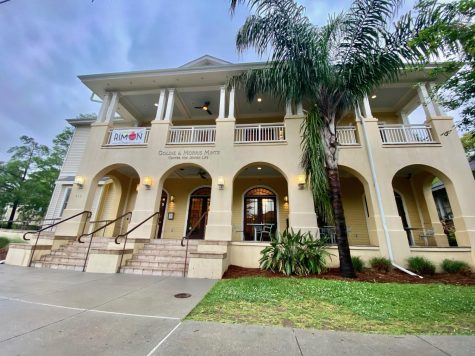OPINION | Religious practice altered, not halted, by COVID-19
April 14, 2021

When standing at the intersection of Broadway Street and Freret Street, an observer spots several Jewish and Christian ministries nestled between the fraternity houses and The Boot Bar and Grill. These religious centers are an often-overlooked casualty of COVID-19, especially compared to the deafening silence of the once raucous Greek life houses. Nonetheless, the pandemic has profoundly impacted Tulane University’s campus ministries.
Conversations with Tulane-affiliated clergy members reveal that COVID-19 is taken seriously, with each establishment enforcing rules on mask wearing and social distancing. “The building itself is cleaned every day but then we hire a service once a week that does a deep clean of the building,” Reverend Zoë Garry at NOLA Wesley United Methodist Campus Center said, commenting on the precautions taken at her ministry. “We have instituted sneeze guards, masks mandates, [and] social distancing of all our tables and chairs, especially during worship.”
Other places of worship enforce similar measures, with many of them stating that there are no possible outbreaks linked back to these communities. At first glance, these measures appear robust, but their effectiveness only amounts to the community’s buy-in. According to these religious institutions’ leaders, however, students frequenting Tulane’s religious centers properly wear masks and social distance.
Following the Center for Disease Control’s guidelines means that religious services look dramatically different compared to pre-pandemic days. Garry had to cope with the changing city guidelines regarding live music as the city-wide infection numbers swelled and receded. Chaplain Watson Lamb of the Chapel of the Holy Spirit, an Episcopal and Lutheran ministry, lamented the loss of traditional Sunday dinners, a popular gathering spot for all members of the community regardless of religious affiliation or lack thereof. Rabbi Leibel Lipskier of Rohr Chabad Jewish Student Center successfully mobilized Passover packages so people were still able to celebrate during the initial quarantine. As Passover concluded for the second time during the pandemic, local residents watched as students carried to-go boxes filled with Passover kosher meals, picked up from the Chabad and nearby Tulane Hillel.
Perhaps the one thing each of the campus ministries is predominantly worried about is being able to provide support for their congregants. Both Garry and Lamb report that attendance dropped during the pandemic, and finding a way to stay in contact with the community remains a priority.
Garry attributes at least part of the drop in attendance to a change in ministers at NOLA Wesley. This is Garry’s first year at the church, only arriving in June 2020, fresh from seminary school.
The emphasis on maintaining and growing a community raises an obvious question. How does one create and maintain community when large gatherings are not an option? In truth, no one knows the correct answer, but different approaches have yielded similar results.
For Chabad, Lipskier is most focused on community and the importance of Chabad’s capability to provide for its congregants. When speaking about Judaism, “[It] is very much about family and community, it’s part of our faith. Its family, community, and I think the pandemic has only emphasized and increased the need for it,” Lipskier said. Lipskier decentralized most of the programming at Chabad, changing from one large event to try and gather as many people as possible to several smaller events meant to prevent the spreading of COVID-19 between pods. The Rabbi also created a support system for students through Chabad but admits that making sure students do not fall through the cracks is one of the current big challenges.
At NOLA Wesley, much of the community building centers on the building itself. Different groups, from regular Sunday service and Alcoholics Anonymous meetings to the Labyrinth Café, all share the same space. These groups do not necessarily interact, but it does demonstrate a visible community impact during a difficult time. Alcoholics Anonymous, in particular, is a welcome sign, especially as evidence is emerging that alcohol abuse rates have increased and that those with substance use disorders are more likely to have a more severe case of COVID-19.
Looking towards the future, at least one ministry is planning great steps to ensure that no one slips through the cracks anymore. Lamb intends to open a counseling center that is within walking distance from campus, directly behind the Chapel of the Holy Spirit. The counseling center will be open to everybody and will act to supplement the mental health services provided by Tulane. The chapel already has one counselor on staff who was receiving students that the Tulane counseling center was referring out to him. During one instance, Tulane referred at least 20 students to the chapel counselor when he was already fully booked, causing a conflict in the system that required the counselor to refer these students elsewhere.
Nonetheless, a greater emphasis on mental health is always positive and looks to be an answered prayer after a difficult year.
As the city slowly opens up, Tulane’s religious groups will no doubt modify their ministries to better serve the community. The final legacy of the pandemic remains uncertain, but it appears certain that a greater appreciation for community and mental health will be included. When Tulane reopens fully next fall, it will be worth watching the university’s religious centers to witness the full scope of COVID-19’s impact of religious worship and a potential return to normalcy.






















Rachel • Apr 15, 2021 at 11:33 am
Such a great article! This was very well written.